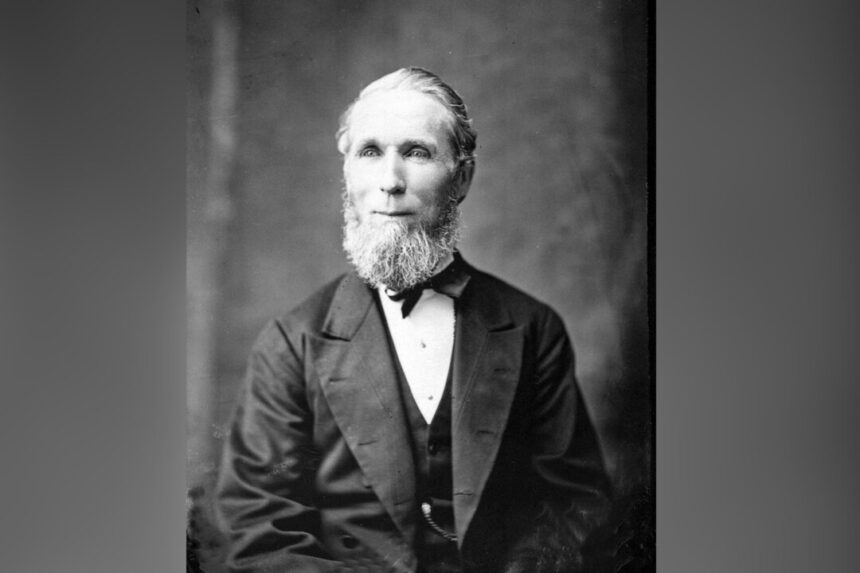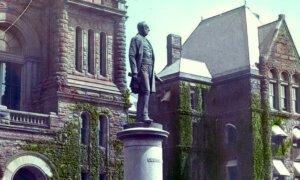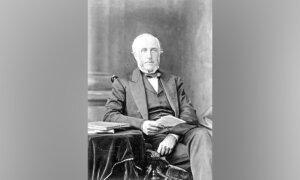Commentary
One day in the early summer of 1874, two gentlemen appeared unannounced at Fort Henry outside Kingston, Ontario. Today the fort is a National Historic Site but in those days it was an active military installation, home to A Battery, Garrison Artillery (today part of the 1st Regiment Royal Canadian Horse Artillery), and a gunnery school, among the first full-time permanent Canadian military elements.
The two men approached the guard at the gate and asked to be “shown around.” To such a request, out of the blue, a sentry’s only response would be something like, “And who might you be, sir?” They answered: “The Prime Minister of Canada.” The other was his personal secretary, William Buckingham, an Englishman formerly on the staff of George Brown’s Globe newspaper.
Alexander Mackenzie, the longtime secretary of the Reform Committee of Port Sarnia and a 30-year friend and political ally to Brown, had become prime minister in November 1873 when a campaign finance scandal obliged Sir John A. Macdonald to resign and the fledgling Liberal Party won the 1874 election. In five years as prime minister, the incorruptible Mackenzie completed the Parliament Buildings, introduced the secret ballot in Dominion elections, established the Supreme Court of Canada, and created the role of auditor general as an independent watchdog to keep the politicians and the bureaucracy honest.
Born in the village of Logierait in the Scottish Highlands, all his life he loved “the auld Scots songs,” sung again to him in later years by his grandchildren. He quit school at 13 to support the family as a stonecutter, the year his father died at age 52. When 20, young Alex came to Canada for love—following the family of his sweetheart, Helen Neil, settling in Kingston in 1842, as he put it, “a nameless mason lad” with “scarce 16 shillings in my pocket.”
Stopping in Quebec City on the way, he explored the 1759 battlefield where Highland soldiers had played a key role, “like a schoolboy let loose on a holiday,” according to “The Hon. Alexander Mackenzie: His Life and Times,” the biography written by his friends, journalist William Buckingham and Sir George Ross, publisher, education reformer, and fifth premier of Ontario. Alexander convinced his brothers and mother to follow him to Canada, and they settled in thriving Port Sarnia.
On Saturday evenings he would walk across frozen Lake Ontario from the quarry on Wolfe Island to visit the Neils. He twice fell through the ice and nearly drowned. (Undeterred, he carried a long pole in case he was unlucky a third time.) On a later occasion, 17 of his work crew drowned when their boat capsized in Deadman’s Bay off Newfoundland. Another time, while working on the Beauharnois Canal in southwestern Quebec, Mackenzie’s leg was crushed by a one-ton construction block.
Known as an extremely able foreman, he later worked on the Welland Canal and the Lachine Canal and then went into business with partners as a builder in towns across Upper Canada. He contributed to the construction of many key buildings in Ontario, like the Essex County Court House and St. George’s Anglican Church (now called All Saints) in Sarnia.

Painting of Alexander Mackenzie. Public Domain
Being a school leaver, Mackenzie continued to read history, biography, and religion; Dickens, George Eliot, Burns, Shakespeare, Byron, George Macdonald’s children’s fantasies, above all Sir Walter Scott’s novels—so that in his speeches “he could readily quote from the poets, and from current literature.” In 1841, at age 19, he had made the romantic pilgrimage to Burns’ house in Dumfries.
Before he left Scotland, Mackenzie also adopted his strong lifelong faith as a Baptist, though he kept an affectionate regard for the Scots Presbyterianism of his childhood. He always attended both morning and evening services in the Baptist Church whether in Sarnia, Toronto, or Kingston. He laid the cornerstone of the First Baptist Church in Ottawa and faithfully attended Sunday services there. He was a strict temperance man, opposed all consumption of alcohol, and this contributed to his eventual defeat in the election of 1878.
Dissenting Protestantism went hand in hand with political Reformism. Mackenzie devoured newspapers and admired the Scottish Chartists, whose six points called for a secret ballot, one-man one-vote, no property requirement for MPs, MP salaries (so that not only gentlemen could afford to sit in Parliament), representation by population, and annual elections.
Arriving in Upper Canada he gravitated to the Grits and Reformers. He befriended George Brown, owned and edited the pro-Reform Lambton Shield newspaper, and first ran for a seat in 1861. After Confederation, when Brown and Edward Blake refused, Mackenzie accepted the Liberal mantle and became the Dominion’s first Leader of the Opposition in 1873.
And so, as Prime Minister in 1874, Mackenzie made his unexpected appearance at Fort Henry.
We are told that a messenger “was sent across the bridge over the Cataraqui River,” to the Tete de Pont Barracks to inform the commanding officer (CO), Maj. de La Cherois Thomas (D.T.) Irwin. In those days, the CO could not simply text someone in Ottawa to confirm the preposterous sounding claim that the prime minister had come.
“I at once rode up to the Fort,” Irwin wrote, and found the gentlemen “waiting outside.” Mackenzie “had neglected to inform me of his visit” and “had no one to blame but himself.”

The Mackenzie Building at the Royal Military College of Canada in Kingston in 1880. Mackenzie’s government established the college in 1876. Public Domain
It would seem Mackenzie deliberately arrived impromptu in order to avoid time-wasting flummery. He would also wish to avoid imposing unnecessarily on the gunners, who would have been put to much extra trouble by a formal visit, polishing buttons and boots, grooming horses, forming up, marching, waiting, etc. It was not in Mackenzie’s character to impose on the rank and file like that.
He had long been interested in military affairs. He had served as a Major in the 27th Lambton Battalion of Light Infantry, known as the St. Clair Borderers, during the Fenian Raid of 1866, a dramatic episode in the history of Canada-U.S. relations, spending “several months under canvas at the head of his company.”
Arriving at the gate, “I found him most agreeable,” Maj. Irwin later recalled.
Mackenzie did not divulge his reasons, but was “anxious to see all he could of the different buildings, stores, etc.” Oddly enough, Mackenzie knew his way around, inspecting closely the structures in various states of dilapidation. “When going through the empty rooms,” Maj. Irwin was surprised that he “bade his Secretary make a note of various small repairs which seemed needed.”
“We then went to Point Frederick,” the next promontory to the west, in the direction of Kingston, “where the Premier wished to inspect a Martello Tower” in the fort. In 1874 the tower served as married quarters but up top, under the roof, were mounted three 32-pounder Single-Barrel Muzzle-Loader guns.
“Ascending the narrow stairway in the outer wall,” the prime minister “tapped the latter and asked me how thick it was.” Maj. Irwin didn’t know: “I was obliged to confess my ignorance.” But Mackenzie said, “It’s five foot six inches. I know, for I built it myself.”
The prime minister’s vision for Point Frederick was to establish there a cadet college to form and train professional military officers for Canada, on the lines of Sandhurst in England and West Point in New York. With its own professional officer cadre, Canadians could then take a full share in their country’s defence and depend less on Imperial officers.
Sir John A. Macdonald’s defence policy, according to historian Richard Preston, “rested entirely upon the principle that the British would provide any regular forces that were needed and that Canada’s contribution should be limited to a part-time militia.”
In contrast, Mackenzie invoked the British Liberal doctrine that a self-governing dominion ought to shoulder the burden of its own defence and that this would strengthen, not weaken, the Empire. The Military College at Kingston, established in 1876 and dubbed “Royal” by Queen Victoria two years later, would help make that dream a reality.
Mackenzie lost the 1878 election to the resurgent Macdonald. He resigned and was replaced by Edward Blake, though he remained an MP until his death after a fall in his garden in 1892 at the age of 70. He had published “The Life and Speeches of Hon. George Brown” in 1882. He refused a knighthood because he preferred that titles be reserved for only “a few scientific and professional men, unconnected with politics.” The last book read to him by his granddaughter was James Stalker’s Baptist classic, “The Life of Jesus Christ.”
George Brown said of Mackenzie: “It will be a bright page in the history of Canada that tells that the first Reform [Prime] Minister of this great Dominion was the noblest workingman in the land.”
Views expressed in this article are opinions of the author and do not necessarily reflect the views of The Epoch Times.











